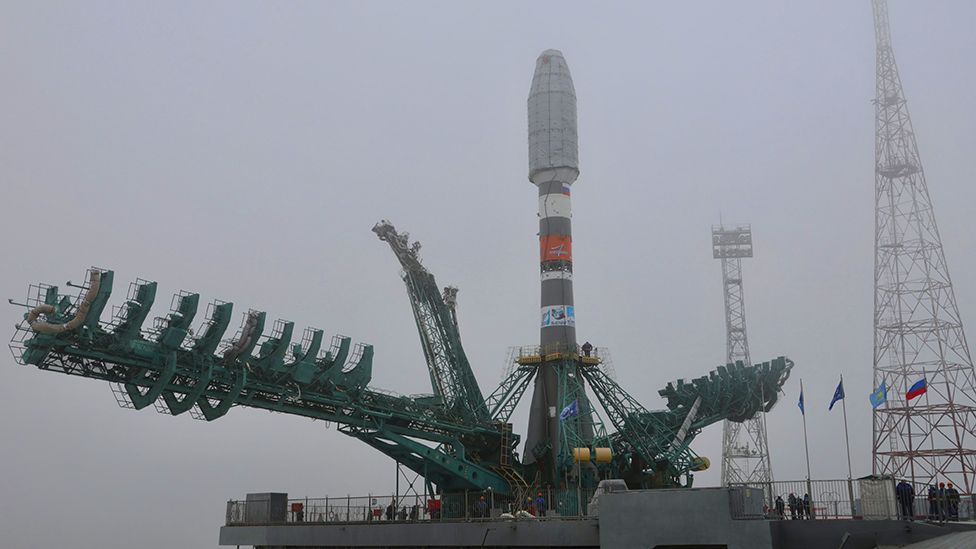OneWeb: Russian ultimatum over UK satellite launch
 Image source, Roscosmos
Image source, RoscosmosThe Russian space agency Roscosmos has said it will not launch satellites part-owned by the British government without guarantees they will not be used for military purposes.
A Soyuz rocket carrying 36 satellites for the internet firm OneWeb is due to go up from the Baikonur Cosmodrome in Kazakhstan on Friday.
Roscosmos head Dmitry Rogozin said OneWeb had two days to provide "legally binding" guarantees.
OneWeb has yet to comment.
The UK government, which has come under pressure to pull the launch because of the war in Ukraine in any case, said it was continuing to discuss the situation with its partners on the OneWeb board.
UK taxpayers helped buy OneWeb out of bankruptcy in 2020 with a £400m stake.
In an interview with Russia 24 TV channel, Mr Rogozin said Roscomos had contacted OneWeb and its partner Arianespace to demand "comprehensive legally binding guarantees" that the satellites would not be used for military purposes.
"If by 21:30 on March 4 we do not receive confirmation, the rocket will be removed from the launch pad and the satellites will be sent to the assembly and test building," he added.
The launch is currently timed for 22:41 GMT on Friday (03:41 local, Saturday).
According to Russian news agency TASS, Mr Rogozin said the OneWeb contract had been paid in full and the funds would not be returned.
"We received all the money for it for the manufacture of launch vehicles, upper-stages and for the necessary launch services.
"This money, due to force majeure circumstances that have arisen as a result of the aggressive policy of the West and the sanctions that are applied against Russia, this money will remain in Russia," the Roscosmos boss stated.
The space agency's twitter feed later went a step further, demanding the "hostile" UK government withdraw its shareholding from the London-headquartered company.

This is an impossible ask for OneWeb, and you can be sure that the UK government will not be selling its holding at the request of Moscow. Ever since British taxpayers took a share in the company post-bankruptcy the talk has been about adding defence and security capabilities to future OneWeb satellites.
Low-Earth orbiting broadband internet constellations present an emerging challenge for authoritarian regimes. While they can simply turn off terrestrial networks to control the flow of information, this is much harder to achieve with space infrastructure.
The numbers of satellites in these new constellations, and the speed at which they move across the sky, make them hard to jam.
US entrepreneur Elon Musk this week shipped antenna terminals to Ukraine to allow citizens there to use his Starlink broadband system.
At the moment, most of Ukraine would not be able to plug into OneWeb because much of the country is too far south for its signals. The future launches planned by OneWeb would ultimately though have filled in this gap.
Former UK government adviser Dominic Cummings, widely regarded as the official who persuaded Prime Minister Boris Johnson to buy into OneWeb, tweeted at the weekend that a situation such as that in Ukraine was in their minds when making the investment.

OneWeb has just a handful of launches left to complete its network of 648 satellites.
All of the missions are booked on Russian Soyuz vehicles that are scheduled to fly out of Baikonur in the coming months.
With the existing spacecraft it has in orbit (428), the company can deliver broadband internet connections to locations above 50 degrees North, which includes business customers such as BT in the UK, but it needs those additional satellites if it wants to run a truly global service.
Regions important to the company's prospects, including the rest of Europe, most of the US, Africa and Asia, would be left out.
Commons business committee chair, Labour MP Darren Jones, wrote to the science and space minister, George Freeman, on Tuesday, to call for the launch to be scrubbed. He said the mission was inappropriate following Russia's invasion of Ukraine.
A UK government spokesperson told reporters that it was right for questions to be raised about future space cooperation with Russia, that it was in discussions with its OneWeb partners, and that ministers would set out more detail in due course.



No comments